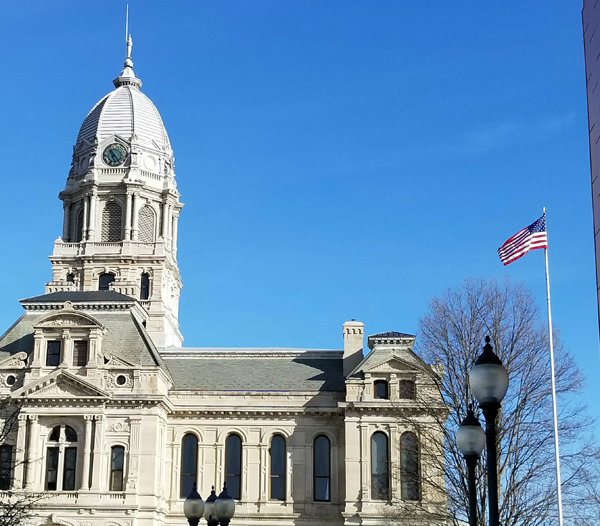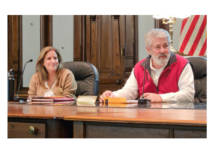Several interesting statistics on juvenile crime and U.S. 30 traffic were shared at the Kosciusko County Council meeting Thursday.
In presenting his request to apply for a third year of the Juvenile Detention Alternatives Initiative grant, Superior Court I Judge David Cates said that in the first half of 2019, compared to the first half of 2018, Kosciusko County juvenile detention admissions were down 46%. The average length of stay of juvenile detentions was down 73%. The average daily population of juveniles in detention was down 77%. The county is saving about $140 per day.
“I think JDAI money is being well spent,” Cates said. Councilman Doug Heinisch asked if Cates had any statistics on the juvenile crime rate. “Filings are pretty flat,” Cates said. “Surprisingly, a lot of auto theft. A lot of drug issues. Lots of fights, primarily school fights. But for the major crimes and felonies, for whatever reason, auto theft is one of the highest. But fairly flat from one year to the next, so we’ve reduced the detentions and saved the county some money without having too much in additional filings.”
Cates’ request to apply for the JDAI grant of $88,759 was approved 6-0, with his wife, Kim Cates, abstaining. Council President Sue Ann Mitchell said, “The JDAI meetings have been very educational for me.” She said there’s been great participation at those meetings “and they have developed the criteria for what they want to do with kids, what they think is the best, and I think that’s going to be a very successful program going forward.”
Cates said the next meeting is at noon Dec. 19 in the Justice Building meeting room, and invited the council members to attend. Two other county judges – Joe Sutton, Superior III, and Torrey Bauer, Superior II – requested, and were approved, for an additional appropriation of $60,000 to pay for pauper counsel. Sutton said about 1-1/2 to 2 years ago, the judges shifted Cates’ Level 5 and 6 felony dockets to Superior II and III.
“Criminal filings themselves are up substantially,” he said. Bauer said he has 300 more misdemeanor cases than last year and all the extra felonies. Sutton said with the increased load, he didn’t “have the wisdom to jack the budget enough” for this year to pay for all the pauper counsel. “We actually submitted claims for $48,000 of this anticipated $60,000 already … for public defenders. So even if we’re approved, we’re going to try skate by on $12,000 to get through December,” Sutton explained.
He said they’ve worked hard to try to recapture public defender fees through the courts and prosecutor’s office through plea agreements. “We’re giving it 110%, we’re just short of money at this point … and here we are,” Sutton said. Bauer said the new court, Superior IV, came into play in July. “And that’s when we got hit with all the additional felonies and that’s when all of our money started going out. So we didn’t anticipate, when we budgeted for the last year, that we were going to get the court and we were going to get all these additional felonies to even out the case loads between all five of the courts. That, as well as an increasing caseload, is what has created the shortfall this year,” Bauer said.
Sutton said they anticipated the fourth court to take some of the court load, but that turned out to be juvenile and family cases. Bauer said the last figures he had was that “we had recouped about $90,000 so far this year in Superior II, pauper counsel fees. That’s going to be down from the years past.” A reason it’s going to be down for Superior II and III, Bauer said, is primarily because “we can’t as aggressively collect the fees as we used to. That’s primarily because of the implementation of the Odyssey system. I would need an extra staff person just to try to collect fees with all the summons, and notices and warrants and all the people just not showing up.”
He said Odyssey has changed the way courts collect fees. Now, the courts must use collection agencies if a person doesn’t pay fees and fines in 90 days. “So, to some extent, what we get in the future is going to be dependent upon how aggressive the collection agency is in pursuing those sums from people because we just don’t have the ability with Odyssey to do what I had been doing the last 4-1/2 years,” Bauer said. The judges and the council discussed if the fees and fines could be taken out of a person’s state tax returns. The judges were told that could be done with anything that the government is owed.
Later in the meeting, Kim Cates said she attended an Association of Indiana Counties (AIC) state legislative affairs meeting. “We’ve been told they’re going to focus on healthcare, energy and infrastructure. And part of the infrastructure, which our AIC is lobbying for, is … when they divided the sales tax this last session, the division took more out of the local amount going to infrastructure and highway. It was supposed to be net revenue neutral. It was presented as revenue neutral to legislators, but it actually is killing us.”
She said it’s hurt Kosciusko County by about $600,000 so far this year. Cates said she also attended the U.S. 30 Coalition meeting with Mitchell in Columbia City “which gave us up-to-date information on the 30 Coalition.” Mitchell said, “I think they came at it from a totally different approach because they are trying to encourage large employers and transport companies to get on board with trying to convince the state that U.S. 30 is big and it needs to be redone as quickly as possible.” She said in all likelihood, it’s at least 10 years down the road, but if it doesn’t get started it won’t get accomplished.
“The goal is to make that road be an actual freeway, so there’s no get-ons and get-offs. There would be at the major roads,” she said. Some “shocking” statistics were provided at the U.S. 30 meeting, which she shared Thursday. Mitchell said, “38,500 people a day travel on 30. If it was a freeway, the estimate is that there would be 81,000 people that would travel on it, There would be no getting on, getting off. There would be no stopping and starting. No stop signs, no stop lights that would impede the travel, so more (traffic) could be moved. And the more we move – time is money to industry, to truckers.” She said it was a good meeting because many facts were presented. The biggest encouragement was that there were many “business people” there.
The Coalition was trying to encourage those people to reach out to the Indiana Department of Transportation to “reinforce that this is something that is important and it is big.” At the end of the meeting, Mitchell reminded the council that at its January meeting it needs to reorganize and she could not serve as council president because she will be the president of the state association.





